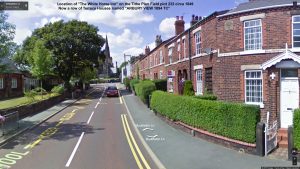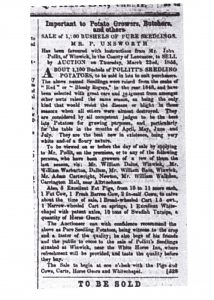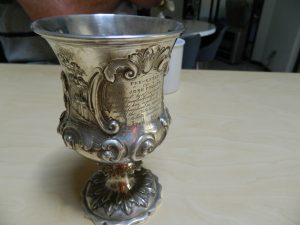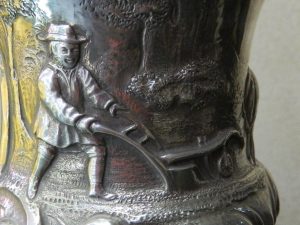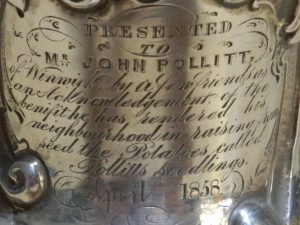Did you know that in Winwick, after the 1847 potato blight, Winwick resident, John Pollitt, created a seed potato that was blight free?
He lived in Winwick at Green Pit farm which was owned by Reverend Hornby, the then incumbent of Winwick Church (as was all the land since before 1066). The house “Apple Garth” is now on Golborne Road (formerly called Hermitage Lane).
He was presented a cup for his work in 1858 at a presentation at the White Horse Inn, Winwick.
The cup is now in Perth, Australia which belongs to his Great Great Grandson Ian Pollitt.
In 2016 I was asked by John Marshall of Fife, a retired potato breeder, where through his contacts during his presentation to the Liverpool Agricultural Discussion Society: Mr Marshall enquired at this meeting, about the John Pollitt cup presented in 1858 at Winwick as to where he could research the history behind the cup. Which currently is in the possession of John Pollitt’s great great grandson Ian Pollitt, who lives in Perth, Australia. Mr Marshall was given my name from a local Winwick Farmer who was attending the Liverpool meeting. To which, I proceeded to help Mr Marshal’s quest for Ian Pollitt.
After several searches in the Winwick Church Register, Census records, Warrington Museum on back issues of the Warrington Guardian and Kelly’s Directory of Lancashire and Cheshire. Especially the Tithe Plan 1835 and Tithe Plan Information 1849 and Maps found on the National archives of Scotland. The picture began to emerge that John Pollitt was indeed living in Winwick, and occupied the farm and fields, owned by Reverend Hornby of Winwick Church, known as Green Pit Farm, Hermitage Lane, Winwick Green.
The various articles discovered also revealed other interesting historical events about Winwick. The Cup was presented at the White Horse Inn, Winwick which could seat for a function evening meal 60 to 70 persons, the Inn also had a bowling green. Clues showed the Inn to be directly opposite Winwick Church on Myddleton Lane,. But in the latter half of the 19th Century the White Horse Inn disappeared. The plausible explanation could be due to Mrs Smith who is recorded to be the publican of the Inn retired and no-one took over the tenure ship of the premises. The site of the White Horse Inn, opposite Winwick School, is now where the row of Terrace houses known as Arbury View 1896, as well as the Post Office which today the cottage adjoining is call “White Horse Cottage”.
Further investigation into John Pollitt was that his son Thomas Pollitt farmed a field off Back Lane (now Waterworks Lane) after the 1849 Tithe Plan information was recorded. This field in 1867 under the Warrington Waterworks Act 1855 became the Waterworks treatment plant, together with the field farmed by Thomas Smith of the White Horse Inn. These fields in 1867 were owned by Reverend Frank George Hopwood rector of Winwick Church.
The various documents regarding John Pollitt, the Waterworks and the White Horse Inn. Together with an article by John Marshall and pictures of the Cup which started the research for Ian Pollitt of Perth Australia, Whose Great Great Grandfather lived in Winwick, created a blight free potato and seedlings, honoured by his peers, John Pollitt of Winwick for the good work he had achieved. The documents are attached here.
Courtesy of Richard Ward, June 2018
Document: Winwick Waterworks Notice 1867 1of2
Document: Winwick Waterworks Notice 1867 2of2
Document: Scan of Pollitt Article (reassembled copy)
Document: Pollitt’s Seedlings Article
